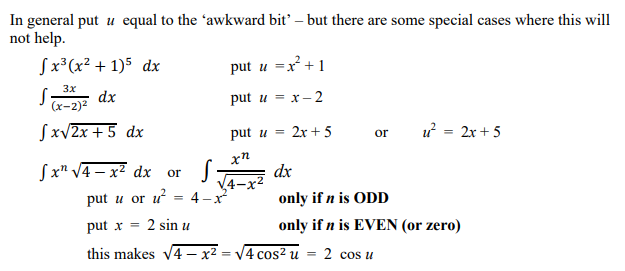Original post by moz4rt Why would I use a trigonometric substitution when n is even and not when n is odd?
Why would I use a trigonometric substitution when n is even and not when n is odd?
 Why would I use a trigonometric substitution when n is even and not when n is odd?
Why would I use a trigonometric substitution when n is even and not when n is odd?If is even, you will get even powers of trigonometric functions, which are nice to work with because you can convert between them using the identity (e.g. , so you can get an expression entirely in terms of ). Odd powers of trigonometric functions are less easy to work with since you can't reduce things to only one trigonometric function in this way.
Original post by Prasiortle
If is even, you will get even powers of trigonometric functions, which are nice to work with because you can convert between them using the identity (e.g. , so you can get an expression entirely in terms of ). Odd powers of trigonometric functions are less easy to work with since you can't reduce things to only one trigonometric function in this way.
Oh thanks, I did it using constants and got to that but didn't think it was of much use as you would still get large powers and use de moivre;s theorem of something like that.
Original post by moz4rt
Oh thanks, I did it using constants and got to that but didn't think it was of much use as you would still get large powers and use de moivre;s theorem of something like that.
Yes, with large powers of trig functions, you would use De Moivre's Theorem and the Binomial Theorem to express them in terms of trig functions of compound angles, which can then be integrated.
Quick Reply
Related discussions
- Need help with some Alevel business multiple choice question
- URGENT!!! Swapping UCAS university choices
- Applied Calculus Help
- A level ocr mechanics
- Nucelophiles Vs Ligands
- Substituting choice for Med after 15th October
- chemistry question!
- Help with a simultaneous equation PLEASE
- A level integration help
- UCAS help?
- Maths Integration
- AS level Maths (pure) - HELP ME wtf is this question
- SN1 and SN2 reactions (chemistry)
- Partial differential equations question
- Integration identification
- Knowing which particular integral to use for ordinary differential equations
- Isaac Physics Lorentz Transform 2 Help
- A level chemistry
- Chemistry help🙏🏼🙏🏼
- Electrophillic/nucelophillic substitution /addition
Latest
Trending
Last reply 4 days ago
Did Cambridge maths students find maths and further maths a level very easy?Last reply 2 weeks ago
Edexcel A Level Mathematics Paper 2 unofficial mark scheme correct me if wrongMaths
71
Trending
Last reply 4 days ago
Did Cambridge maths students find maths and further maths a level very easy?Last reply 2 weeks ago
Edexcel A Level Mathematics Paper 2 unofficial mark scheme correct me if wrongMaths
71



